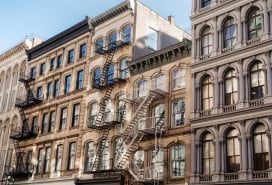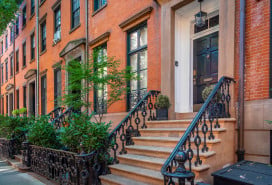Inside New Yorkers' love-hate relationship with fire escapes

There are pros and cons to living with a fire escape outside your window.
Claudia Heidelberger/Flickr
Fire escapes are one of those truly iconic New York City building features (like water towers and building awnings), and like most other aspects of living in the city, New Yorkers have a love-hate relationship with them.
A terrible accident last summer that killed a young actor brought calls for landlords to inspect the often-dilapidated fire escapes around the city. (Note: It’s your landlord’s duty to keep fire escapes up to code, and you can call 311 and request a building inspection if you think your landlord is being negligent.)
“Whether people see fire escapes as an amenity or a security risk depends a lot on the neighborhood they’re renting in,” says Jeffrey Hannon, a broker with Mirador Real Estate.
If they're not concerned with safety, and people breaking in through a fire escape, they see them as charming. If safety is an issue, the fire escape seems like an easy way in.
Some apartment-hunters are also put off by the look of old-fashioned window gates in front of the escapes, but worry when they’re not there since the naked windows might invite unscrupulous types looking to break in, says Hannon. And many more joke that a fire escape is actually a “Manhattan patio,” he says. Here, a breakdown of what New Yorkers think of their fire escapes:
THE PROS
Oh, you know, saving you from a fire
When Rebecca Schrag Hershberg moved into a one-bedroom on the Upper West Side years ago, she noticed that the prior tenant had put an illegal air-conditioner into the window with the fire escape. (Remember: You can’t block a fire escape with an A/C, but we'll get to that later.) Her dad suggested she keep a hammer next to the window in case of emergency. Thinking he was overreacting, she did it anyway. And it was a good thing, since she ended up using it when a fire broke out in the middle of the night.
“What was funny was that it wasn’t my first instinct to use the fire escape when I saw the smoke start to come into my apartment,” she says. “I started to yell and someone who was downstairs on the sidewalk already yelled back at me ‘use your fire escape!'.”
Schrag Hershberg grabbed the hammer, broke the window, and joined her fellow tenants at the bottom of the escapes. “It honestly didn’t occur to me when I first got the apartment that I'd ever have to use it for a fire. I, like all New Yorkers, thought it would be best for plants and keeping beer cold.”
In the late 1970s, Danielle Ledesma Gretz’s mother, and a neighbor, carried her and her sister down a fire escape to safety when a fire broke out on the second floor of their Upper West Side building. “This was in the dead of winter… Snowy and slippery, late at night," she remembers. "Nonetheless because of the fire escape, we all came out alive. We never would have made it out the front door."
A piece of the great outdoors
In addition to saving hers and her family’s lives, Ledesma Gretz says her mother used to use the space as a tanning bed in the 1980s, and would keep potted plants outside. While it is technically illegal to put plants or anything else that could block the fire escape out there, plenty of New Yorkers do. In her old apartment in Astoria, Jenny Verdon used the space to show off a bit of her green thumb (see photo below). “It let me do a little gardening, which was fun,” she says. She couldn’t do it inside because space was an issue, as were her cats, who would eat or dig into them. One of our writers started an accidental vegetable garden on her roof — apparently tomatoes and peppers did the best. (We'd be remiss not to mention that if you are going to put plants out there, they shouldn't block any entrances or exits.)

And while we can’t recommend people stand outside on their fire escapes, we know many people who do, whether for smoke breaks or just some fresh air, in a city where outdoor space is so limited.
“I remember sharing a cigarette with my sister on the fire escape outside her bedroom window on a chilly night on Mercer Street in SoHo," says Yael B., a New York native.
"I love them," says Katie Brannick, another native New Yorker. "Aside from the added safety, “in the summer, it’s a great place to get some son and fresh air.”
THE CONS
Security issues
The reason for this aforementioned “ugly” gates so many people complain about, according to Hannon? Fire escapes—especially those on lower floors—tend to be prime ways for people to break into apartments.
A few years ago, Aaron Rosen came home to his second-floor walkup on the Upper East Side after a holiday weekend away and found that his door his laptop and TV had been stolen. The burglar had gotten into the apartment through the fire escape window.
But Rosen says he wasn’t entirely sure his window was locked when the burglary occured. And the incident didn’t stop him from renting a place with a fire escape again. “We were just always careful about leaving the window locked ever since,” says Rosen.
If you do have a fire escape, be sure to have an FDNY-approved gate on it—the Department has a list of rules and regulations here.
Some insurance companies will require you put bars or a lock on the fire escape window, says Jeff Schneider of Gotham Brokerage (FYI: a Brick sponsor), but most insurance politices do cover theft whether or not the burglar got in through a fire escape window or elsewhere. (Note: Schneider says there may be a negligible increase in insurance rates— a couple of percentage points—for apartments with fire escapes, but that's because many buildings with escapes are not fire-restrictive, not because of theft issues.)
Neighbor noise
One Upper West Side native, Betsy-Jane Lynch, says she’s had problems with noise carrying through. “I don’t like when people in other apartments smoke and party out there and the smoke smell comes into our apartment and the voices carry, and it sounds like the people are talking in our living room and bathroom.” She says she’s still glad she has one, for safety purposes, but “one set of neighbors in particular smoke out there a lot. Two sets occassionally do the loud party every so often…. Guests genuinely don’t get how the sound carries and are typically embarassed. Especially teenagers!”
Air conditioner problems
Generally, residents are prohibited from putting air-conditioners in fire escape windows, which means things in that room can get rather steamy come summer-time (assuming there’s no a/c built into the wall or overhead fan instead). There is a caveat, though. You can, in fact, install one if there is a second window that opens onto the fire escape (assuming that window is big enough for you to actually get through in case of a fire.
Drunken mishaps
Not all fire-escape trespassing is necessarily burglar-related. “After college I lived in a walkup with a fire escape at my bedroom window. While living there a friend of a friend was couch surfing indefinitely,” says Yael Jaari. “[One night] I come home to find my front door busted by the cops. In a drunken stupor he had climbed down the fire escape from my window and started body slamming himself against the window of the poor girl who lived a few flights down and harassed her until the cops came. So fire escapes scare the crap out of me!”
Kids' safety issues
Like terraces, fire escapes can seem too risky for parents of young kids in the unlikely event that a child gets onto it and could fall. And while you should never let a kid play on a fire escape, a strong gate should protect against any problems.
That said, Hannon says he’s seeing fewer and fewer fire-escape gates—possibly a sign of the city staying increasingly safer than the horror stories of the ‘80s. In newer buildings, a lot of landlord are going for extra-strength windows at the fire escape but not necessarily the gates, says Hannon. In fact, plenty of people actually like the look—and practicality of those just-outside-the-window fire escapes.
You Might Also Like




























